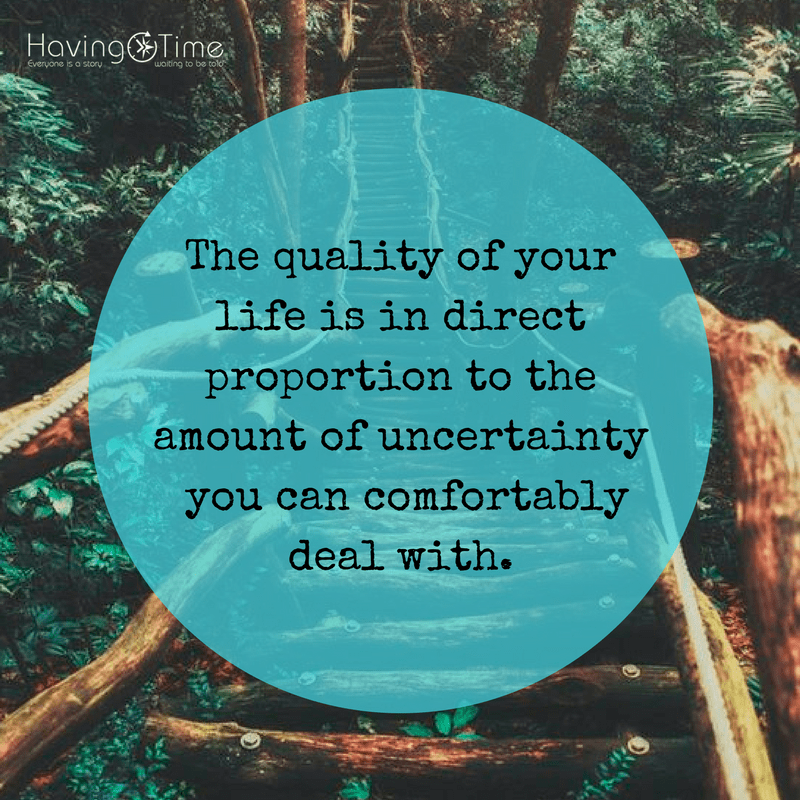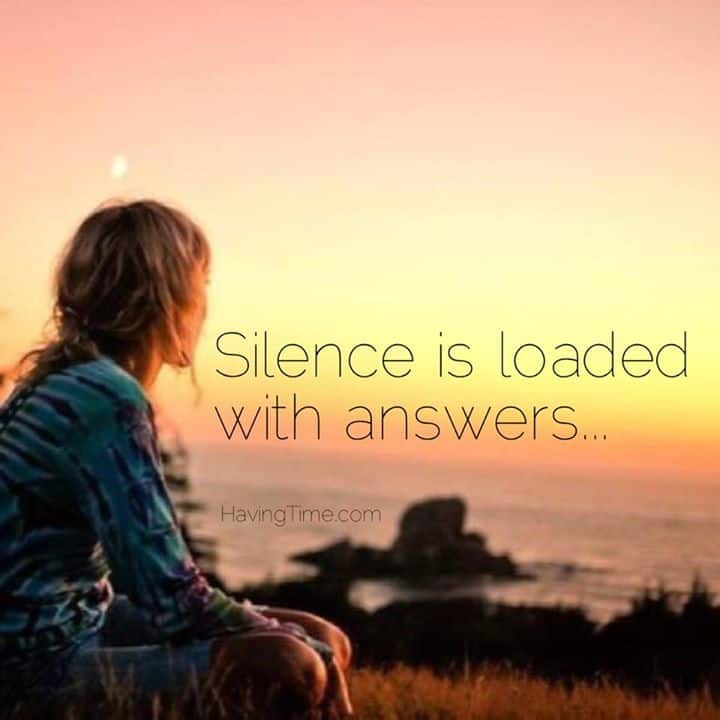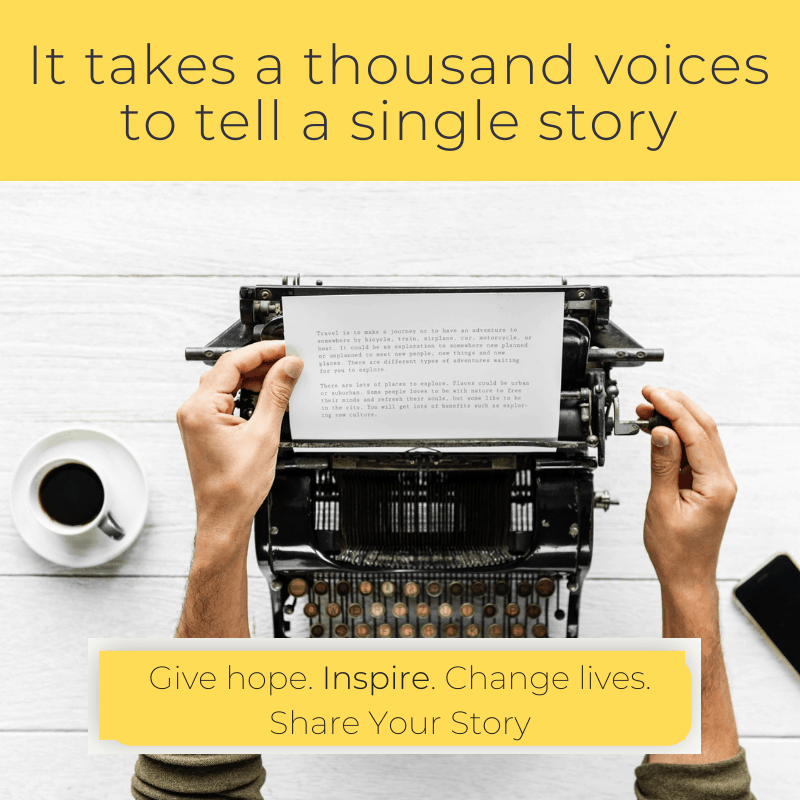
The quality of your life is in direct proportion to the amount of uncertainty you can comfortably deal with. – Tony Robbins
As a law student and lawyer, I tried to think my way to a better life. I tried to think my way out of my depression. I failed completely. By the time I realized I had to stop thinking, I was mired in student debt, working at a job that I hated, and taking pills every day just to get by.
I still take antidepressants, but the other things have changed. How? I had to let go of my ruminating, overthinking rational self, and let intuition guide me to the answer. When you listen, the small voice of intuition speaks wise words.
How much of uncertainty could you be comfortable with?What Intuition Is?
Intuition isn’t a conclusion (“based on this list of pros and cons, I shall change my entire life in precisely six months”). And it’s not a process (“I shall make a list of pros and cons that will decide for me”). Intuition is a place.
It’s a quiet place of mystery that T.S. Eliot called “the hint half guessed, the gift half understood.” Intuition is decision-making grounded in experience and awareness, not just logic.
In The Gifts of Imperfection, researcher Brene Brown defines intuition as “our ability to hold space for uncertainty and our willingness to trust the main ways we’ve developed knowledge and insight, including instinct, experience, faith, and reason.”
Uncertainty, trust, instinct. These aren’t the most concrete terms. As a former lawyer, they make me uncomfortable. But it’s within this space that new ideas are born.
Intuition moves beyond the rationalizations that kept me stuck in my job far too long. My best reasoning got me to a place where I was miserable, where I contemplated suicide. Where I took pills to wake up, to stabilize my mood, and to go to sleep. I couldn’t rely on that same reasoning to get me out.
At the same time, intuition doesn’t discard logic. Intuition guides logic. As Brown writes, “Sometimes our intuition or our gut tells us what we need to know; other times it steers us toward fact-finding and reasoning.” Listening to intuition doesn’t automatically mean you jump in with both feet.
And as much as I wanted it, I couldn’t have certainty. Before a child is born, even the most advanced medical technology can’t predict the sound of its cry or the shape of its smile.
And as much as I wanted it, I couldn’t have certainty. Before a child is born, even the most advanced medical technology can’t predict the sound of its cry or the shape of its smile. I had to allow the process of birth to take place before understanding the new creation. My new creation was throwing off the self-imposed label of a corporate lawyer and embracing my uncertain future on the other side of the world. Your new creation might be a new novel, painting, business, or an entirely new way of living!

What Intuition Isn’t
Intuition relies on emotion, but it isn’t emotional reasoning. Emotional reasoning means charging into battle based on your immediate, visceral reaction to an event. Instead of your emotions informing you, they rule you. Often, that emotion is fear.
When I first explored the idea of leaving my job, the fear froze me. I gave in (many times) to that fear. But that wasn’t my intuition. When I slowed down and explored my feelings, I realized my faith was greater than my fear. If I had listened to the fear, I would still be in that law firm, still sleep-deprived, still miserable.
Intuition is closer to the concept of wise mind from dialectical behavioral therapy. Wise mind is the place where your emotions and rationality overlap, leading to a decision that is true on both levels. You feel wise mind in your gut, in your solar plexus.
As a lawyer, I always fell on the rationality end of the scale. I didn’t trust my instinct. My decisions were based on the best evidence. I coldly calculated my best course. This worked in the courtroom, but it didn’t work in life. Only when I listened to the small voice of intuition was I able to make a wise decision.
Listening to Intuition
I had to get out of my way. Overthinking had frozen me in place, like a rabbit in oncoming headlights. My entire body would seize up when I thought of quitting. If I focused on the thought for too long, I would end up with a headache and sore jaw from clenching my teeth. When I discussed it with my therapist, I’d sit frozen on her couch, a statue that was a mere imitation of a living human being.
I thought myself in circles. I told myself, I’ll quit in six months after I get my bonus. When I got my bonus, I told myself, I’ll quit in six months when my lease is up. That makes sense. And it did! But round and round I went. My excuses oh-so-conveniently created a situation where I could put off action for months!

How to Let Go of the Fear of Uncertainty & Be Free
My depression only grew worse. Eventually, I had no choice but to stay in the silence of uncertainty. Intuition relies on trusting that silence. And you need to – quite literally – find silence. Drive around the block, close your bedroom door. In New York, I used earplugs to block out the construction noise. I sat silently with the question of leaving, but without analyzing it. I listened to my body. I allowed space for my wise mind to speak. As a lawyer with a thousand thoughts rushing through my head, it was intensely uncomfortable. But I had to just stay, stay.
I eventually saw the absurdity of the trap I had built for myself. There would always be a reason to stay, to do the rational thing. But the silence told me what I already knew: I had to leave. I had to stop thinking. I had to trust my intuition.
Your decision will be different than mine. But the power of intuition is the same. Trust the uncertainty, listen to the silence, and embrace your new creation.





